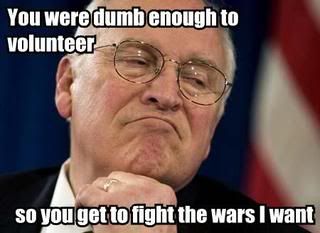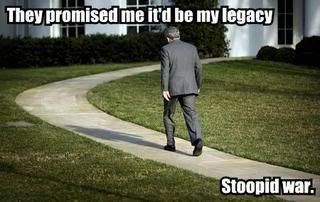
Bill Moyers talks to Phil Donahue and Ellen Spiro about the making of Body of War.AMY GOODMAN: Maybe we have a clip. Maybe we have a clip of what Dick Cheney had to say. Let’s give it a try. I think this is from our headlines today. This is the Vice President, Dick Cheney.
VICE PRESIDENT DICK CHENEY: The President carries the biggest burden, obviously. He’s the one who has to make the decision to commit young Americans, but we are fortunate to have a group of men and women, an all-volunteer force, who voluntarily put on the uniform and go in harm’s way for the rest of us.
AMY GOODMAN: That was Dick Cheney. Tomas Young, was that the quote you would like to address?
TOMAS YOUNG: Absolutely. From one of those soldiers who volunteered to go to Afghanistan after September 11th, which was where the evidence said we needed to go, to the master of the college deferment in Vietnam, the last conflict we didn’t go into voluntarily, many of us volunteered with patriotic feelings in our heart, only to see them subverted and bastardized by the administration and sent into the wrong country. Yes, we volunteered, but we didn’t volunteer where you sent us to go. And I realize that we don’t choose where we get to go, but we at least should be sent in the right places to defend the Constitution, just as we volunteered to do. That’s all.
Body of War
Winter soldiers:
The name comes from a quote from Thomas Paine, the revolutionary who rallied George Washington’s troops at Valley Forge, saying: “These are the times that try men's souls. The summer soldier and sunshine patriot will, in this crisis, shrink from the service of his country; but he that stands it now, deserves the love and thanks of man and woman."The movie: Leading to War, How did the US government lead its people to war?
Paine was trying to keep Washington’s army from deserting in the face of a bitter winter and mounting defeats at the hands of the British. Members of Iraq Veterans Against the War say the same type of courage is needed to confront the evils unleashed by the U.S. occupations of Iraq and Afghanistan.
Lawless Atmosphere
"The problem that we face in Iraq is that policymakers in leadership have set a precedent of lawlessness where we don't abide by the rule of law, we don't respect international treaties, argued former U.S. Army Sergeant Logan Laituri, who served a tour in Iraq from 2004 to 2005 before being discharged as a conscientious objector. “So when that atmosphere exists it lends itself to criminal activity."
Bush's War on Frontline on PBS.

No comments:
Post a Comment